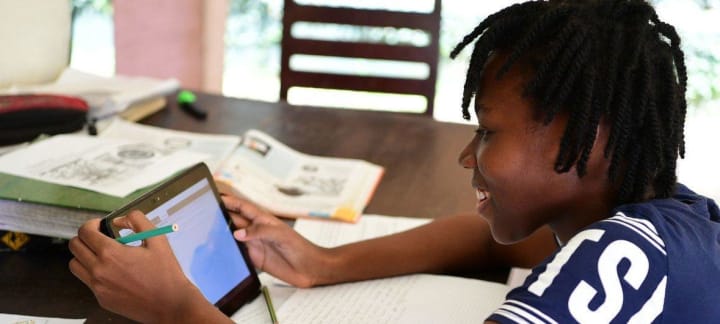To avert a global learning crisis, UN interview: Transforming education
Transforming Education

Interview: Transforming Education to Avoid a Global Learning Crisis
The Summit on Transforming Education, a central event of the opening week of the new General Conference, which opens on September 16, aims to refocus attention on the global crisis regarding education and propose solutions to adapt education to the 21st century. Ahead of the event, UN News spoke with Leonardo Garnier, Special Adviser to the Secretary-General for the Summit on Education for Change.
Many education experts are concerned that the new crown epidemic has done immeasurable damage to the educational prospects of children around the world, further exacerbating an established problem of declining educational standards, with millions of children receiving minimal or inadequate education, or worse, no education at all.
In the days leading up to the Summit on Education for Change, UN News interviewed Leonardo Garnier. Garnier, an academic and former foreign minister of Costa Rica, was appointed by the UN Secretary-General to serve as a special advisor to the summit.
He explains why there can't be a return to old ways of teaching and learning, and how the United Nations can help bring new ideas to classrooms around the world and raise the standard of education for children around the world.
UN News: The UN is currently dealing with many major geopolitical issues, such as the climate crisis, the new crown epidemic, and the war in Ukraine. Why did you choose education as this year's theme?
Leonardo Garnier: This is the right time to discuss education. Because in a slowing economy, education tends to be neglected and is no longer a priority. Governments need funding, so they call a halt to spending on education.
The problem, however, is that the dangers of cutting spending on education will not become apparent until several years later. In the case of the education crisis of the 1980s, it was not until the 1990s and the millennium that the losses suffered by countries due to a lack of investment in education surfaced.
Millions of children were out of school due to the new crown epidemic. The epidemic has also exposed problems that have existed for years because many schoolchildren are not learning properly.

UN News: Can you tell us about the education crisis of the 1980s? What happened then, and what were the consequences?
Leonardo Garnier: There was stagnation around the world, and education budgets were drastically cut. Enrollment dropped, the number of teachers declined, and many children missed out on education, especially high school education.
This means that in many countries, only about half of the workforce completes primary education. When you consider the growing poverty and inequality in many countries, it is hard not to make the connection to the decline in educational opportunities in the 1980s and 1990s.
UN News: Do you think the situation we are seeing now is likely to lead to a repeat of the crisis?
Leonardo Garnier: I think it's possible. From 2000 to 2018, we have seen an increase in enrollment and investment in education in most countries. But after 2018, education budgets started to decrease; then, the new crown epidemic hit.
For more than two years, education was at a standstill in many countries, accompanied by an economic crisis during that time. Therefore, there is a real risk of a return to the crisis, meaning that instead of recovering from the new crown epidemic, we could be in a worse position than in 2019.
The Secretary-General has said that we must protect education from this major blow and make up for the damage caused by the new crown epidemic. But in reality, we have even more work to do.
Under Sustainable Development Goal 4: Ensure inclusive and equitable quality education and lifelong learning opportunities for all, the United Nations and the international community have set ambitious targets.
You may think that everyone should have the right to education, but we won't achieve our goals if we continue the practices we had before the new epidemic.
The message we want to convey at the Education Transformation Summit is that if we truly want every young person on the planet to have the right to quality education, we must change the way we do things. We must transform schools, and the way teachers teach, use digital resources, and fund education.
UN News: What are your thoughts on adapting education systems for the 21st century?
Leonardo Garnier: The education system has to do with the applicability of the content taught. On the one hand, we need basic educational knowledge such as literacy, numeracy, and scientific thinking; on the other hand, we need what people call "21st-century skills", such as social skills and problem-solving skills.
Teachers need to impart knowledge by stimulating students' curiosity, helping them solve problems, and guiding them through the learning process. But to do this, teachers need better training, better working conditions, and higher salaries, because, in many countries, teachers are poorly paid.
Teachers need to understand that their authority comes not only from having more information than their students but also from having the experience and ability to guide the learning process.
In labor activities, productivity depends in part on the tools we use. When it comes to education, we've been using the same tools for about 400 years! With the digital revolution, teachers and students have access to more creative tools for teaching and learning.
At the Education Transformation Summit, we believe that digital resources are what economists call the quintessential public good. They require significant investment and are expensive to produce, though once produced, they can be used by everyone.
We want to turn digital learning resources into public goods so that each country can share its resources with others. For example, teachers from Argentina can share content with teachers from Spain; Egypt has a great digital education program that can be shared with other Arab countries.
Digital learning resources are quite promising, but we need to integrate all the content and form partnerships for digital learning resources. Such partnerships are just another thing we called for at the summit.
About the Creator
boland gracelyn
And I know it's long gone and there was nothing else I could do






Comments
There are no comments for this story
Be the first to respond and start the conversation.